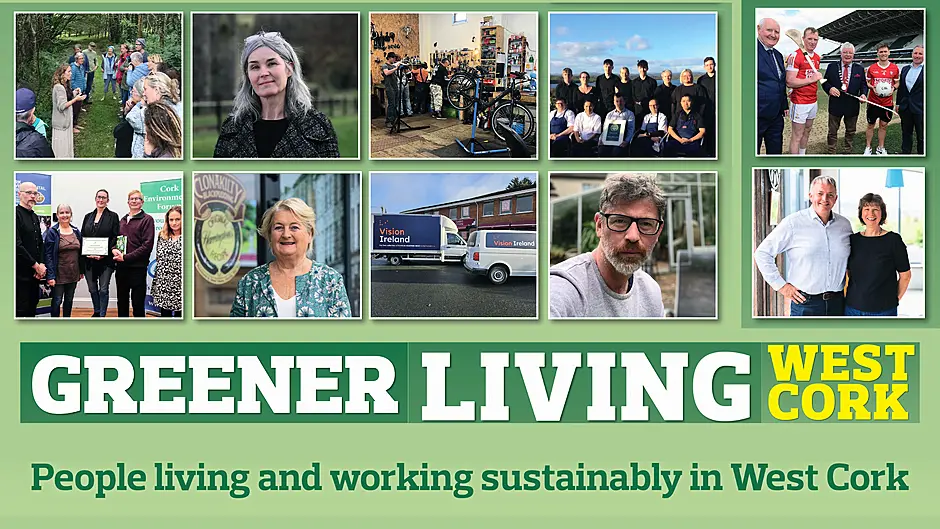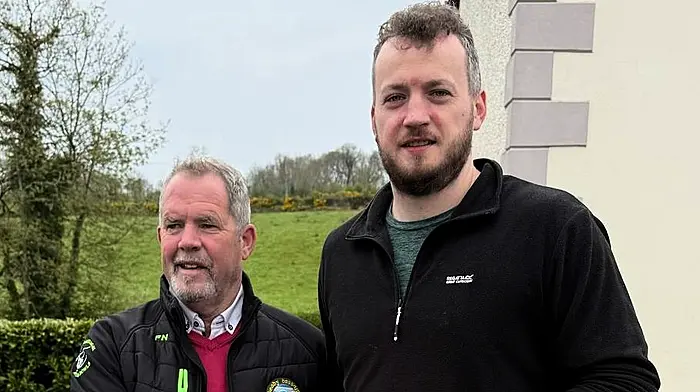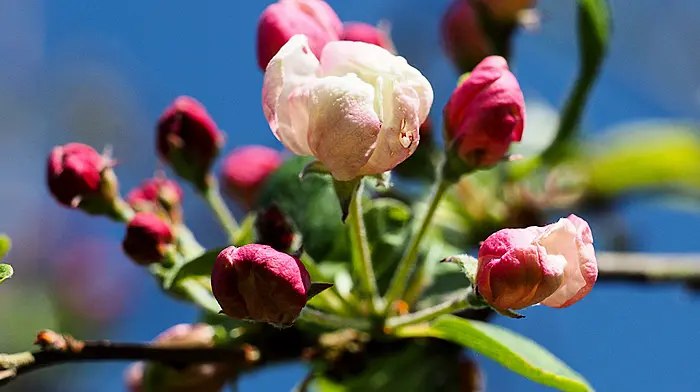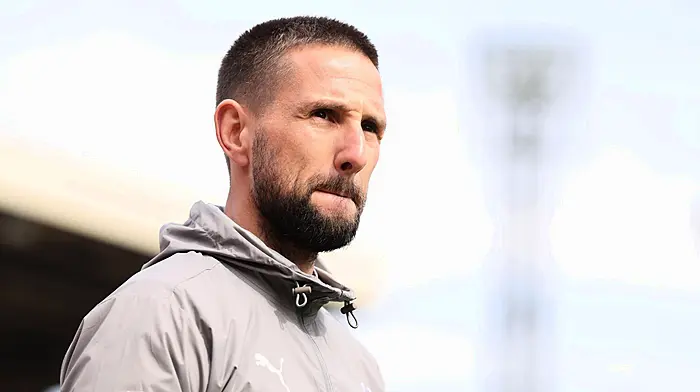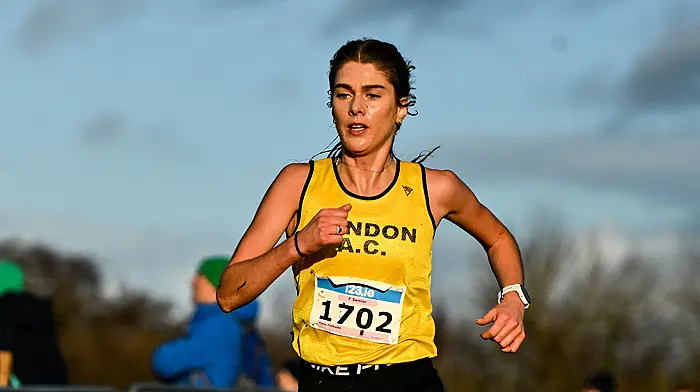WE shine a light on local West Cork businesses, community groups and organisations that are leading the way in sustainability and protecting our environment.
This article was featured in our Greener Living Winter 2024 supplement – you can read the full supplement here!
MyGug, Clonakilty
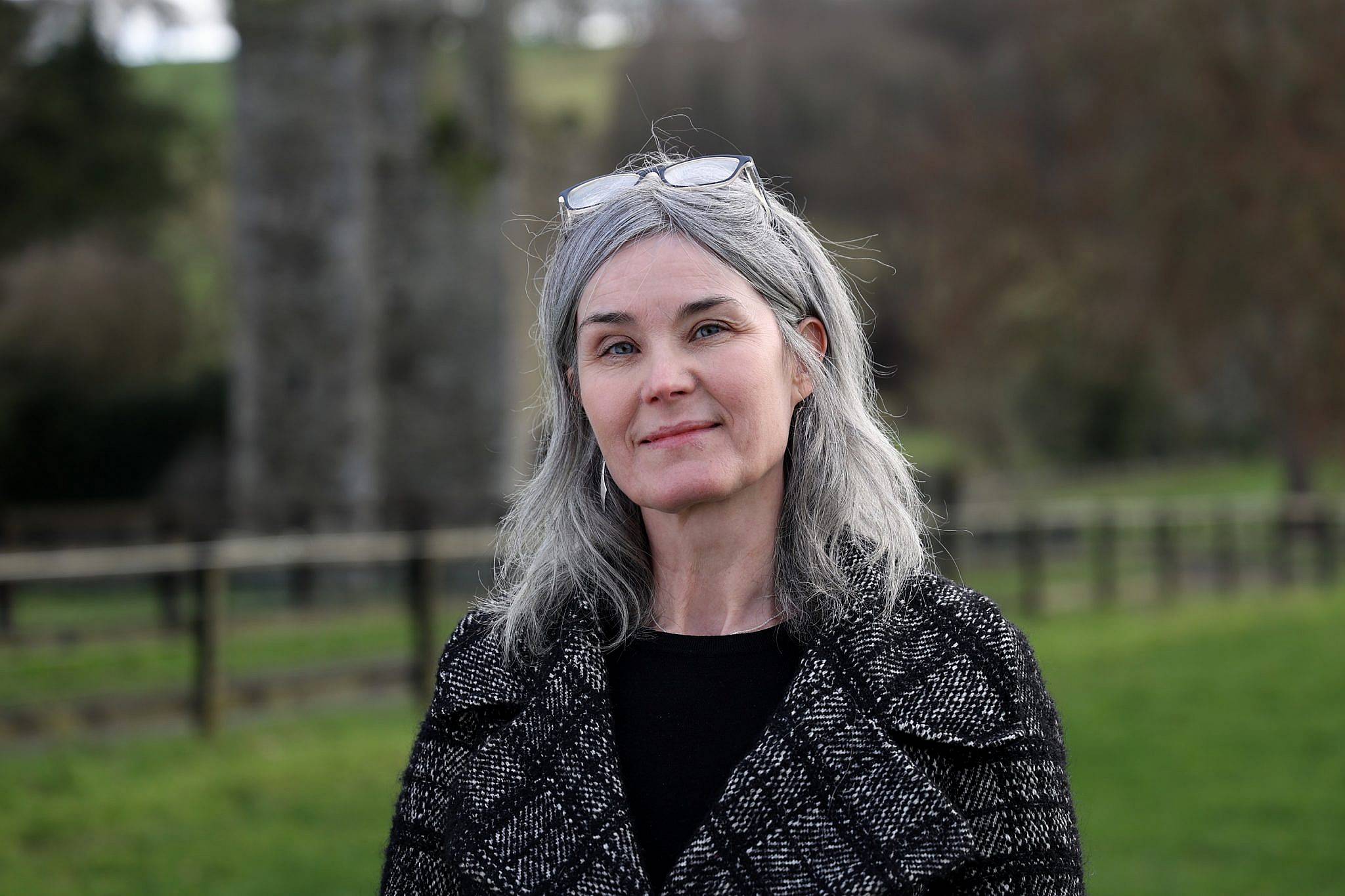 Fiona Kelleher of Clonakilty- based MyGug.
Fiona Kelleher of Clonakilty- based MyGug.
Helping businesses tackle food waste
MyGug started its journey of development in 2022, led by Clonakilty-based Kieran Coffey and Fiona Kelleher.
It’s a green technology that creates renewable energy from food waste, essentially transforming a problem into a sustainable solution with economic benefits.
‘The motivation to develop MyGug comes from a belief that to mitigate climate change we need to work together,’ says Fiona. ‘Food waste is a growing challenge and for most of us the only option is collection services which is not a sustainable solution. MyGug is creating positive change and changing the face of food waste from a burden to a solution. We are driven to create change and to help food businesses and the education sector lead the way in sustainable change and creating a circular economy.’
As well as creating a product with the ambition to provide a positive impact for the world, Fiona and Kieran are conscious of sustainability across all aspects of the business.
‘We use recyclable materials in our production process with little or no packaging of product. We monitor energy use and use renewable energy in the business as much as possible as well as ensuring we are saving energy through vigilance and energy conservation,’ said Fiona.
Current clients are food businesses and the education sector including Kinsale Community School.
‘We are delighted with our MyGug biodigester which is an excellent educational tool for students and staff at Kinsale Community School. It is a perfect illustration of how the circular economy can work, converting food waste from our Home Economics rooms to a biogas which is then used in one of our Home Economics rooms and the liquid fertiliser is used on our veggies in the school greenhouse. It has attracted a lot of attention with its unique design and we have a dedicated Transition Year team who manage and monitor its operation,’ said Klaus Harvey of Kinsale Community School.
Recently, MyGug was one of just nine companies presented with a Certificate of Achievement for Innovation at Enterprise Ireland’s Innovation Arena Awards final at the National Ploughing Championships.
MyGug is building the team with four staff currently employed to facilitate growth in Ireland and UK in the short term with further plans to expand into Europe.
See MyGug.eu for more.
Cork GAA
 Pat Horgan, chairperson, Cork GAA; Conor Cahalane, senior hurler; Cllr Joe Carroll, Mayor of the County of Cork; Kevin O’Donovan, senior footballer and Enda Buckley, Cork GAA Sustainability Committee chairperson, at the launch of the GAA’s Community Clean-up Day. (Photo: Jim Coughlan).
Pat Horgan, chairperson, Cork GAA; Conor Cahalane, senior hurler; Cllr Joe Carroll, Mayor of the County of Cork; Kevin O’Donovan, senior footballer and Enda Buckley, Cork GAA Sustainability Committee chairperson, at the launch of the GAA’s Community Clean-up Day. (Photo: Jim Coughlan).
‘Vision’ to make clean-up an annual event
The GAA held its inaugural Community Clean-up Day on September 21st last, and it was such a success it may now become an annual event.
The sporting organisation held the community-focused event the day after world clean-up day, demonstrating its commitment to environmental stewardship and community service.
Players, coaches, officials and supporters came together to clean up various locations throughout the county with a common goal of collecting and properly disposing of large volumes of waste.
The event is part of Cork GAA’s Sustainability Vision: the idea being that the organisation is sustained by its communities where the passion for games is passed from one generation to the next, and steps must be taken to ensure the planet in a stronger position to the next generation.
Cork GAA’s chairperson, Pat Horgan said they were ‘incredibly proud of our members for organising this vital initiative.
As sports people, we understand the importance of maintaining clean and safe spaces for both our training and our community. This event is a testament to our commitment to not only excel in sports but also to be responsible citizens.’
Cork county and city councils offered major support to the initiative, providing gloves, bags etc to all those who registered in advance.
Chairperson of Cork GAA’s sustainability working group Enda Buckley said there were 93 clubs in total who came on board and participated in the clean-up day, in some cases in association with the local Tidy Towns group.
‘There were literally thousands of volunteers, with large numbers participating throughout West Cork,’ he said.
Enda’s own club, Castlehaven, collected an impressive 29 bags of rubbish in the area.
‘This is a great example of how the GAA can make a tangible impact beyond the sports field.
The idea now is to hopefully reach out to other sectors of the community, and potentially make this an annual event.
Glenilen Farm, Drimoleague
 Alan and Valerie Kingston of Glenilen Farm in Drimoleague.
Alan and Valerie Kingston of Glenilen Farm in Drimoleague.
Sustainability is a mind-set
Glenilen Farm is owned by Alan and Valerie Kingston and located on Alan’s family farm in Drimoleague.
In 1997 Valerie started making cheesecakes and yoghurts in the kitchen from the milk from their own herd and selling at local farmers’ markets. A few years and a few recipes later by 2002, a commercial processing unit was built on the farm which has been added to and expanded over the years to the current factory, employing 70 people.
Both Alan and Valerie come from dairy farming backgrounds where sustainability and looking after nature is a mind-set. Glenilen Farm’s motto is ‘we can’t change the world, but we can change our small corner, and we take great care to do our bit right here in West Cork.’
‘Our main ingredient milk, is sourced from within just five miles of the dairy. Being able to produce healthy wholesome products from this wonderful raw ingredient is so important to us in Glenilen Farm,’ said Alan.
160 KVA of PV solar panels have been installed on the factory roof to produce 20% of Glenilen’s electricity needs and all the purchased electricity is from renewable sources.
‘We have made a commitment to reduce our use of fossil fuels for steam generation by 23% between 2023-2027,’ said Valerie.
‘As well as that we are on a mission to use the most sustainable packaging possible. Our glass yoghurt jars are both recyclable and up-cyclable, while our other yoghurt pots are all recyclable. Any surplus products are donated to Food Cloud whilst food waste from the factory is fed to a few pigs that we keep on the farm,’ she added.
The couple are proud to have obtained Gold Membership of Bord Bia’s Origin Green programme and to help reduce their carbon footprint, they have planted nearly 8,000 native Irish trees on the farm.
In the summer the wildflower meadow in front of the factory is a delight to behold, acting as a great source of food for Valerie’s bees.
‘We strive to do the best for our corner,’ concluded Valerie.
See GlenIlenFarm.com for more.
Clonakilty Food Co.
 Colette Twomey, owner and managing director of Clonakilty Food Co.
Colette Twomey, owner and managing director of Clonakilty Food Co.
Big commitments throughout the Company
Sustainability is at the core of family-run business Clonakilty Food Co.
The recipe for its world-famous Clonakilty Blackpudding dates back to the 1880s in Harrington’s Butcher Shop, at 16, Pearse Street Clonakilty. The secret recipe was passed down through generations of family butchers until in 1976 when the butcher shop and its secret pudding recipe was bought by Edward Twomey. This award-winning recipe remains a secret to this day and Colette Twomey, owner and managing director of Clonakilty Food Co is the only person who knows it.
The product range has expanded over the years, and the company now employs around 55 people, mainly in Clonakilty but also in Dublin, UK and Australia. Just over eight years ago it invested in a state-of-the-art, purpose-built factory on Western Road, Clonakilty.
The company is a gold member of Origin Green, Ireland’s pioneering food and drink sustainability programme, and members of Guaranteed Irish, something they proudly call out on all of their product packaging.
As part of their commitment to Origin Green they set targets against some key sustainability measures including energy, waste, social responsibility and biodiversity.
The company is committed to running a more energy-efficient business and in 2022, installed solar panels and air-to-water heat recovery units to reduce its demand on the grid and provide the business with clean, sustainable energy. In 2023, 27% of the energy consumed came from solar.
All of its waste is segregated onsite, all cardboard and plastic is recycled, and it is collected by their waste collectors.
Needless to say Clonakilty Food Co works to a very tight food production process. However, it is inevitable that there is some food waste, but this is collected and is taken to an anaerobic digestor plant and turned into biogas. This is then used to power vehicles and to generate heat and power for the national grid.
Ingredients and raw materials are sourced from local suppliers where possible in order to reduce its carbon footprint.
Each year Clonakilty Food Co plants and harvests its own crop of onions in Clonakilty and uses these in the production of the famous pudding.
Last year Clonakilty Food Co added biodiversity as an additional target as part of its commitment to Origin Green and its broader sustainability plans. As a result the company has developed a wild meadow and a no-mow area for spring and summer and it has planting onsite of bee and insect-friendly flora.
See Clonakiltyblackpudding.ie for more.
BEAG, Bandon
 Frank O’Connor of Anois (left) making a presentation under the community and voluntary category to Bandon Environmental Action Group (BEAG) members at the Environmental Forum awards night in 2023. Included are Wendy Bond, Anna Roycroft, Gef Dickson and Isabelle Sutton.
Frank O’Connor of Anois (left) making a presentation under the community and voluntary category to Bandon Environmental Action Group (BEAG) members at the Environmental Forum awards night in 2023. Included are Wendy Bond, Anna Roycroft, Gef Dickson and Isabelle Sutton.(Photo: Cork Environmental Forum)
‘Small’ group making a big difference
BEAG, or Bandon Environmental Action Group, was set up in 2019 by a group of locals in the Bandon area who care about the environment. Its objectives are to assist in making a positive contribution to the community on a broad range of issues that affect the environment.
Currently the group has an 11-person committee from various work backgrounds, including ecology, outdoor education, social work, health, as well as parents, and in the past, students.
Over the past few years the group has been involved in various projects including planting over 2,000 trees in and around Bandon with the Green Economy Foundation and Trees on the Land initiative.
‘We worked with Avondhu Blackwater Partnership and leader funding to realise a Biodiversity Action Plan for Bandon. This document lists over 55 actions which are to be completed over five years (2023-28). We have already implemented or completed over half of these actions through our own continuing work, as well as cooperating with the local council, other community groups, schools and sports clubs, amongst others,’ said Anna Roycroft, BEAG’s communications officer.
‘We also focus on education, through training and workshops, talks and walks. Some events we’ve hosted have included the biodiversity of stone walls, bat talk and walk, river tour looking at the history, heritage and the life that depends on it, citizen science, composting, recycling and handling garden waste to name but a few. Other areas we plan to cover include invasive plant species, wildlife rescue, dry stone wall building, habitat mapping and hedge laying,’ she said.
BEAG also gives biodiversity talks in local schools, runs art and photography competitions, assists with habitat management plans for schools, sports clubs, public areas (including Bernard’s bridge walk) and heritage sites (St Mary’s cemetery), biodiversity actions with the local tidy towns group, including pollinator friendly planters, herb planters, fruit bushes and trees.
‘We are also keen to collaborate with other community groups, schools, sports clubs and businesses to achieve more and reach more people.
Anyone can subscribe to our mailing list at [email protected]. This is the best way to hear about our latest events or get involved in the hands-on work we do. Follow us on Facebook or Instagram (beag_bandon), or email us to enquire about joining our very active committee,’ concluded Anna.
Páirc ‘n Tobair, Rosscarbery
 A recent foraging walk in Páirc ‘n Tobair. One of the founders, Sr Kathy Cunningham is in the centre of the photo.
A recent foraging walk in Páirc ‘n Tobair. One of the founders, Sr Kathy Cunningham is in the centre of the photo.
A protected space for all
Rosscarbery's Páirc ‘n Tobair comprises 25 acres of land in protection, dedicated to being a safe haven for biodiversity, part of which is set aside as a social and therapeutic garden for people with learning difficulties, mental health issues or individuals just in need of a quiet space. All are welcome to come to recharge and connect to nature using the space each week.
Located in Rosscarbery, it was founded by two Sisters of Mercy in 1999 (Sr Kathy Cunningham and Sr Maria Hayes).
The land belonged to the Sisters of Mercy but was gifted by them to Green Sod Ireland, in whose care it now is.
Green Sod Ireland was set up in 2007 to protect and conserve Irish land in perpetuity for present and future generations. Its mission is to protect land for its own sake and the sake of all species that live on it.
‘Initially the project comprised 25 acres of grassland. Over the years, over 20,000 native trees have been planted. The site now comprises three ponds, wildflower meadows and a memorial grove with trees dedicated to loved ones that have passed away,’ said Paul Cullen, caretaker.
‘There is also a tree nursery where native Irish trees are grown from seed, two polytunnels with an outside vegetable garden with fruit trees and bushes.
‘We also keep hens. In addition, organic food is grown, which is shared with the community on our food stand (honesty box) at the entrance to Páirc ‘n Tobair.’
One of the many projects that have taken place here was tree planting by the Ukrainian community living locally.
As well as caring for the planet, another aim of the project is to educate and empower the community to make positive changes for the environment, and to help people connect to nature.
There are three community employment workers who work on the land, along with a gardening group that comes to help.
Members of the Co-action group help with the hens and the growing of vegetables, and CAMHS (Child and Adolescent mental health service) also use the space.
Future plans include further tree planting and the construction of an amphitheatre.
‘Occasionally we have volunteer days. If people are interested in lending a hand they can email [email protected],’ concluded Paul.
Green Economy Foundation, Leap
 Green Economy Foundation CEO, Cillian Lohan.
Green Economy Foundation CEO, Cillian Lohan.
A practical approach to biodiversity
West Cork-headquartered Green Economy Foundation is an non-government organisation that works in areas including biodiversity, climate change and resource efficiency.
Established over 20 years ago its guiding principle is to work within the community, and during Covid the group moved from Manch Estate to the collaborative space in Myross Wood, Leap hosted by Cecas (Centre of Excellence for Climate Action and Sustainability).
The group is funded through donations, and support from the Irish Environmental Network, and this support has allowed them run a successful education programme, working with hundreds of local schools over the years.
‘We focus on practical projects that we can lead or facilitate through our organisation. We use the knowledge we gain from this approach to then try to influence government policy,’ explains CEO Cillian Lohan.
‘One example of this is our Trees on the Land project. This involves working with farmers, landowners and schools to plant native trees all over the country. Last year we passed the milestone of planting over two million trees. We are in regular contact with the Forest Service to try to influence how government grants for tree planting function and are distributed. We were the first to identify the demand for small-scale planting schemes. Not everyone wants to commit to planting thousands of trees but many want to plant a few hundred or less. With this approach we can help to extend habitats, and create pockets of biodiversity throughout the country,’ added Cillian.
A recent project involves working with Skibbereen-based community groups who are developing a West Cork Donut Economics project.
This, says Cillian, will help businesses and community groups to understand the concept of transforming our economic model into one that works within the planetary boundaries – being prosperous without destroying our environment.
Nikki Keeling coordinates community projects while Cillian takes this local knowledge and works within the EU institutions to influence and change policies that come from the EU.
‘This fulfils our desire to be a truly bottom-up organisation, taking messages from communities to the highest level of policy-making,’ said Cillian.
• See @greeneconomyfoundation on Instagram.
Cycle Sense, Skibbereen
 The Cycle Sense workshop in Skibbereen.
The Cycle Sense workshop in Skibbereen.
Safety, active travel and re-purposed paint!
Cycle Sense is a social enterprise in Skibbereen that was co-founded in 2007 by friends Katie Mann and Ruth Bullough. Katie had been running a cycle training course on Sherkin and Ruth was struggling to cycle her kids to school in Skibbereen, and so it was decided to collaborate and start Cycle Sense.
Dedicated to promoting cycling and also re-use, Cycle Sense teaches cycle skills and road safety training for all ages and abilities (reaching approximately 1,000 students a year), bike reuse and repair services (nearly 100 unwanted bikes have been rebuilt in its workshop so far this year) and advocates for active travel. Cycle Sense also volunteers, as members of the community with parents and teachers, to marshal on the weekly Skibbereen Cycle Bus.
‘Our mission is to encourage and support those trying to cycle and navigate busy roads,’ said Katie.
‘We want to make cycling accessible and affordable. Beyond cycling, the Cycle Sense workshop is about upskilling, education and creating a friendly and happy work environment. Regular bike servicing is available and rebuilt bikes are for sale, usually people choose a bike from the ReUse Bike project’s salvaged bikes and it is rebuilt for them.
'Additionally, anyone can use the community workshop to service their own bike or pick a bike from the store of salvaged bikes and rebuild it with the support of a mechanic. It is a busy, friendly environment where there is always time for a cuppa and a chat – we have a small garden too. The best bit about Cycle Sense is the team made up of instructors, volunteers, Tús Workers and enthusiastic re-users! The collaboration and social aspect of the workshop is very important.’
Waste reduction is another major focus, and the enterprise sells ReLove paint, made from repurposed water-based paint left at civic amenity sites that has been filtered, remixed and repotted to make new colours.
‘The ReLove paint project started as a collaboration between Cork County Council and Cork City Council and with funding from the Environmental Protection Agency (EPA) Local Authority Prevention Network. Both Councils continue to provide great support. We are also very happy to be working with the staff of Clonakilty, Bandon and Derryconnell Civic Amenity sites. In 2023 we collected 2,300kgs of paint and distributed approx 1,500 litres of remixed ReLove paint,’ said Ruth.
Looking to the future, the group would love to develop a dedicated cycle track and training area at the workshop to help develop more bespoke courses for people.
‘We’d like to build a fleet of diverse bikes for all abilities. We’d also like to sell more paint and develop other reuse initiatives. And for some blue sky thinking – we’d love to see infrastructure within Skibbereen providing safe connected routes for both the pedestrian and cyclist,’ said Ruth.
See cyclesense.ie for more.
Casey’s of Baltimore
 Casey’s of Baltimore has been ahead of the pack for a number of years in terms of environmental awareness. Right: Dominic Casey with some of the staff of the popular hotel.
Casey’s of Baltimore has been ahead of the pack for a number of years in terms of environmental awareness. Right: Dominic Casey with some of the staff of the popular hotel.
Well ahead of the curve in Casey’s
Sustainability is at the core of everything at Casey’s of Baltimore, a well-known, family-run hotel and restaurant.
Ann and Michael Casey took over the bar in 1975 and the couple were well ahead of the curve when it came to environmental awareness. For example solar panels were installed in the hotel and townhouse 15 years ago to help heat hot water while photovoltaic solar panels were installed earlier this year.
‘The hotel uses condensing heat boilers to heat the building. The cottage building also has a geothermal heat source which has been used for the past 20 years, and we recently installed a new electric car charger that charges two cars at a time,’ said Dominic Casey who now runs the business with a team of 16 full-time and 20 part-time staff.
There’s a strong focus on food sustainability, and reducing food waste. Herbs, lettuce, rhubarb, apples and raspberries are grown for use in the hotel, and as many other items are sourced locally.
The team is committed to reducing waste that goes to landfill.
‘We removed all single-use wrappers, (biscuits, sauces, butter) from the bar, restaurant, and bedrooms and replaced them with homemade biscuits and refillable containers for sauces. We are also in the process of changing to provide high-quality refillable natural bath products in our guest bathrooms and public rooms,’ said Dominic.
‘We also bottle our own water from our own private underground spring for use in our bedrooms and restaurant. In our newer rooms we pipe our spring water directly to the cold water tap in the bathrooms. The same spring supplies the hotel. Glass bottles are reused.
‘We are an active member of the ‘Free Refill Water’ initiative, a voluntary environmental project leading the way to make Ireland a tap water refilling country again. It avoids unnecessary (single use) plastic drinking water bottle waste.’
Casey’s also supports environmentally sustainable tourism by encouraging guests to walk or cycle while staying at the hotel and going forward the plan is to provide opportunities for guests to make their visit carbon neutral.
See Caseysofbaltimore.com for more.
Vision Ireland (Skibbereen, Bantry, Macroom)
 95% of clothing donated to Vision Ireland is recycled or sold for reuse. The organisation, which also facilitates the reuse and recycling of furniture and other household items, will arrange collection where necessary.
95% of clothing donated to Vision Ireland is recycled or sold for reuse. The organisation, which also facilitates the reuse and recycling of furniture and other household items, will arrange collection where necessary.
Playing a ‘pivotal role’ in the circular economy
Vision Ireland, which is the new name for National Council for the Blind Ireland, has sustainability and the circular economy at its core.
The national sight loss organisation provides practical and emotional support, rehabilitation services, and other training designed to help people with sight loss live independently and confidently.
In September, Vision Ireland – which has shops in Skibbereen, Bantry, Macroom – ran ‘Skip The Skip’, a campaign designed to promote environmental sustainability and support for nearly 300,000 people living with visual impairments or blindness across Ireland. Coinciding with #SustainableSeptember, the campaign highlighted Vision Ireland’s free preloved furniture collection service available its stores, including in Cork.
As the second-largest charity shop chain in the country, Vision Ireland Retail plays a pivotal role in the circular economy. By offering a seamless collection service for used furniture, Vision Ireland encourages the community to donate rather than discard, giving preloved items a second life and reducing waste.
‘We are committed to making a substantial environmental impact. With over 130 stores nationwide, the organisation facilitates the reuse and recycling of donated items, including a wide variety of homeware and furniture along with a vast range of vintage and designer clothing, pre-loved furniture, and homeware. In 2024, we estimate that we’ll collect over 109,000 10kg bags of overstock and returns, with a significant 37% of these goods being recirculated for sale. This highlights our ongoing commitment to creating a positive impact on both the environment and the communities we serve,’ said Ciara Coleman, head of business development and growth at Vision Ireland Retail.
The ‘Skip The Skip’ campaign not only helped reduce waste but also supported essential community-based services. These services provide practical and emotional support, along with rehabilitation and training for independent living for those affected by sight loss, said Ciara.
Meanwhile, 95% of the clothing donated to Vision Ireland is recycled or sold for reuse, highlighting the organisation’s role as a leader in sustainable fashion. This effort helps to redirect potential landfill waste, with 410 tonnes (41,067 10kg bags) of unsellable stock repurposed this year alone, collaborating with credible garment recyclers to give materials new life.
In addition to recycling, Vision Ireland’s operations have prevented approximately 10.2 million kg of CO2 emissions through its total rag rate, underscoring its dedication to environmental sustainability while supporting its mission.
See VI.ie for more
Lilly Kinsale
 26-acres of solar panels can, under the right conditions, provide up to 60% of Lilly Kinsale’s energy needs.
26-acres of solar panels can, under the right conditions, provide up to 60% of Lilly Kinsale’s energy needs.
Committed to biodiversity
For over forty years, Lilly Kinsale has been on a journey of sustainability, growing alongside the community and the environment. As part of the overall Site Sustainability Team, the Biodiversity Team that is led by health, safety and environmental associate Olivia Bohan, has undertaken several initiatives to support and protect local ecosystems.
‘Keeping a close eye on the world around us is essential,’ Olivia explains, ‘and we take our commitment to biodiversity seriously.’
Among the cornerstone projects is the Kinsale Harbour Study, launched in 1978 in collaboration with the National University of Ireland Galway. Now one of the longest-running studies of coastal ecosystems in the world, the research assesses aquatic habitat quality and benthic biodiversity to ensure it remains as strong and healthy as it was in 1978.
This year, the study expanded to include surveys of Dunderrow Woods, creating an even broader environmental study profile. Findings, published in peer-reviewed scientific journals, confirm that Lilly’s practices are protective of local biodiversity, and the study continues to offer valuable research opportunities for university students.
Lilly Kinsale’s commitment to biodiversity also extends to a more unexpected spot: protecting our much-needed native pollinators. In early 2023, the site became business supporters of the All-Ireland Pollinator Plan and actively engages with employees on how they can play their part in enhancing native wildflower species that support our solitary bee species.
Additional actions as part of this commitment also included building bug hotels from recycled wood, conducting bird and bat-breeding surveys and planting wildflowers on the manufacturing campus at Kinsale.
Inspired by a group of employees with a shared passion for beekeeping, the site introduced the Lilly Kinsale Apiary, adding a new dimension to the company’s environmental efforts.
‘Bees are essential pollinators, and they’re incredibly sensitive to changes in the environment,’ Olivia says, ‘and we want to do everything we can to protect the population.’
Lilly Kinsale is driven by a mission to make life better—an aim that, as Olivia points out, ‘goes beyond patients to include the natural world around us.’
See Lilly.com for more
Students train to become ‘water ambassadors’
 Sacred Heart Secondary School Clonakilty students Roisin O’Donovan, Katharine O’Donovan, Caoimhe White and Sarah Whelton with Larissa McCarthy (representing Uisce Éireann) during the Water Ambassador training programme at Nano Nagle Place, Cork City.
Sacred Heart Secondary School Clonakilty students Roisin O’Donovan, Katharine O’Donovan, Caoimhe White and Sarah Whelton with Larissa McCarthy (representing Uisce Éireann) during the Water Ambassador training programme at Nano Nagle Place, Cork City.(Photo: Daragh Mc Sweeney/Provision)
Students from across Cork city and county recently gathered to undertake Water Ambassador training alongside staff from An Taisce’s Green Schools team, supported by Uisce Éireann.
Over 30 students from nine different schools, including Sacred Heart Secondary School in Clonakilty gathered at the historic Nano Nagle Place in Cork city to take part in the Water Ambassador Programme, taking the first step to become champions in water conservation and bringing their expertise back into their school and everyday lives.
With a number of interactive workshops throughout the day, students dove headfirst into all things water.
Some facts were more surprising than others to the students, as they learned on average, one person uses 133 litres of water per day and that each day 1.7 billion litres of water travels through the water network in Ireland.
Also presenting to the students on the day, Clean Coasts demonstrated why we need to Think Before We Flush with their unique fatberg sculpture.
Brian O’Leary, regional water operations manager said: ‘We were delighted to have so many enthusiastic students wanting to increase their awareness in water conservation. The Green Schools Water Ambassador programme is a great opportunity for the students to learn more about our water supply, how water is treated and how valuable it is. Safeguarding Ireland’s water supply is a top priority for Uisce Éireann but it is not something we can do alone. Everyone can play their part through practising simple and effective ways to conserve water.’
Jennifer Cooney, Green Schools water officer added, ‘We had interest from secondary school students across Ireland in becoming advocates for our most precious resource: water. At our recent training event in Cork, the water ambassadors delved into topics like river health, water conservation and environmental impacts of fast fashion. We at Green Schools are excited to follow their journey as water ambassadors and see their ideas in motion.’
Elaine Doyle, Clean Coasts campaigns and development officer spoke about the Think Before You Flush campaign, stating ‘The Think Before You Flush campaign was set up in response to the prevalence of sewage-related litter, such as wipes and cotton buds, on Irish beaches.
It is essential that the campaign engages people of all ages, so we were delighted to have the opportunity to interact with the students at the Green Schools Water Ambassador training day in Cork city.
Sewage-related litter affects us all and must be addressed to help protect our environment and wastewater network. Remember, only flush the 3 Ps (pee, poo, and paper). Everything else goes in the bin.’
Green Schools is a grassroots sponsorship focused on increasing awareness and understanding of the vital role that water plays in our daily lives and water conservation through a range of activities, tailored to students at both primary level and secondary level.
This article was featured in our Greener Living Winter 2024 supplement – you can read the full supplement here!

